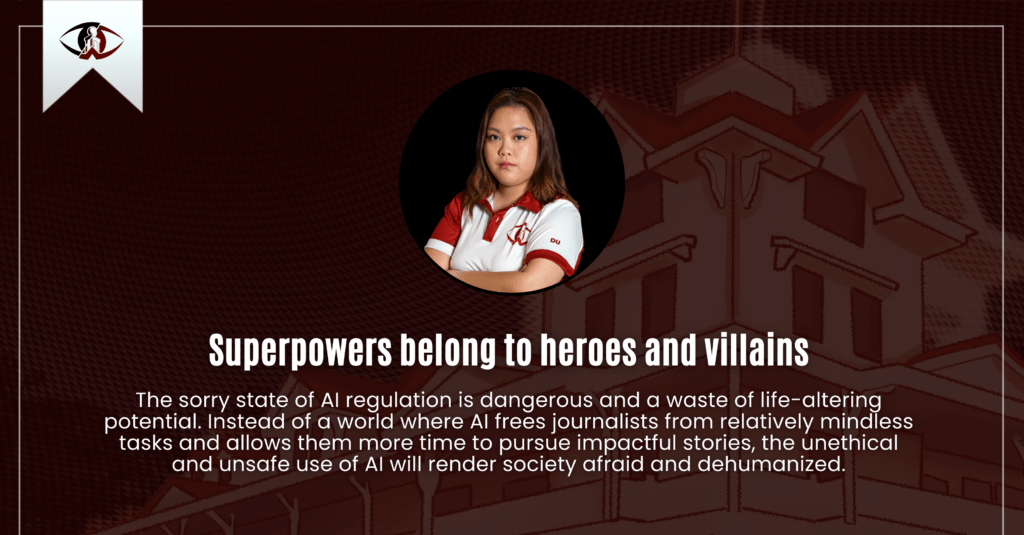By Natania Shay S. Du | March 22, 2024

With great power comes awareness of the harm such power may cause. Strict policy adherence must become a guiding principle when the possibility of misusing this great power comes into play.
Artificial intelligence (AI) is indeed a powerful tool that benefits and even equalizes all fields and professions—especially journalism. But since the launch of ChatGPT in 2022, AI has become a rising threat to journalists because it has been largely unchecked.
The sorry state of AI regulation is dangerous and a waste of life-altering potential. AI can save money, manpower, and resources for painstaking drudge work like transcription and proofreading. It can provide cost-efficient and accessible tools to writers with big stories to cover but have no means to do the extensive legwork in data crunching and analysis. It can point out patterns and trends overlooked in the bustling everyday life of a regular journalist.
But all this is only possible if laws and policies are in place to discipline those who use it irresponsibly—for both the media industry and the rest of society. Otherwise, if AI is left to run amuck, the damage it can do may end up costing us more unimaginable harm.
Instead of a world where AI frees journalists from relatively mindless tasks and allows them more time to pursue impactful stories, the unethical and unsafe use of AI will render society afraid and dehumanized.
Journalists will fear gathering information and publishing in a cyber climate rife with AI-generated information that produces and takes content indiscriminately. Regular readers will fear how AI perpetuates discrimination, disinformation, plagiarism, and data theft. Media workers fear AI will replace them entirely upon the whim of profit-obsessed business owners who know no better about AI’s dangers.
That is how the liberating power of AI then becomes the very shackles that bind us to the interests of the powerful, malicious, and ignorant.
The only way to prevent that is to put laws in place to regulate those that offer AI services and products. While ethical frameworks on AI have already sprouted in certain newsrooms and journalist groups, they should be broadly implemented.
These laws and policies must abide by ethical standards, impose safety measures, and—most importantly—present real and harsh consequences on those who use AI irresponsibly.
It is easy to think that superpower-like abilities should be used freely so that good can be done just as freely—much like the superheroes we see in movies.
But, just like in these films, heroes can turn evil quickly.
AI should be treated the same: It has the incredible potential to liberate us from practical constraints, but it also has the potential to turn society into a world overrun by empowered villains.
This article is an entry for the editorial writing competition of the Organization of Student Services Educators, Inc. National Conference in Campus Journalism and 18th Writing Competition


